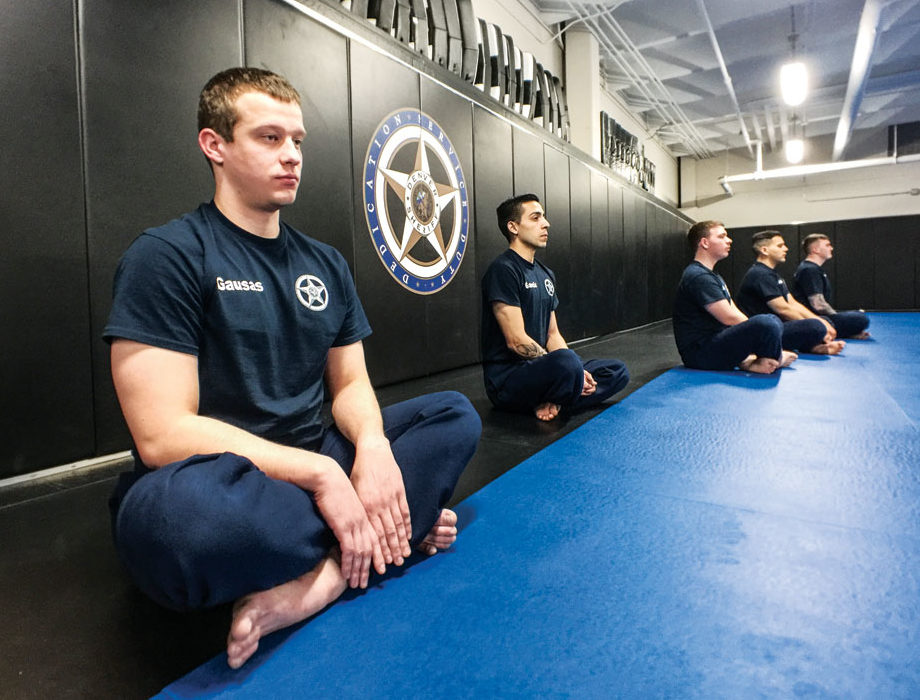
Recruits at the Denver Sheriff Department’s Roslyn Training Center near Northfield learn Yoga For First Responders, a national model based in Denver that helps first responders manage their stress and focus on their own wellbeing so they can better serve others. This year’s academy class is the first to experience the full YFFR series as part of their curriculum.
Denver Sheriff Patrick Firman: A Man with a Mission
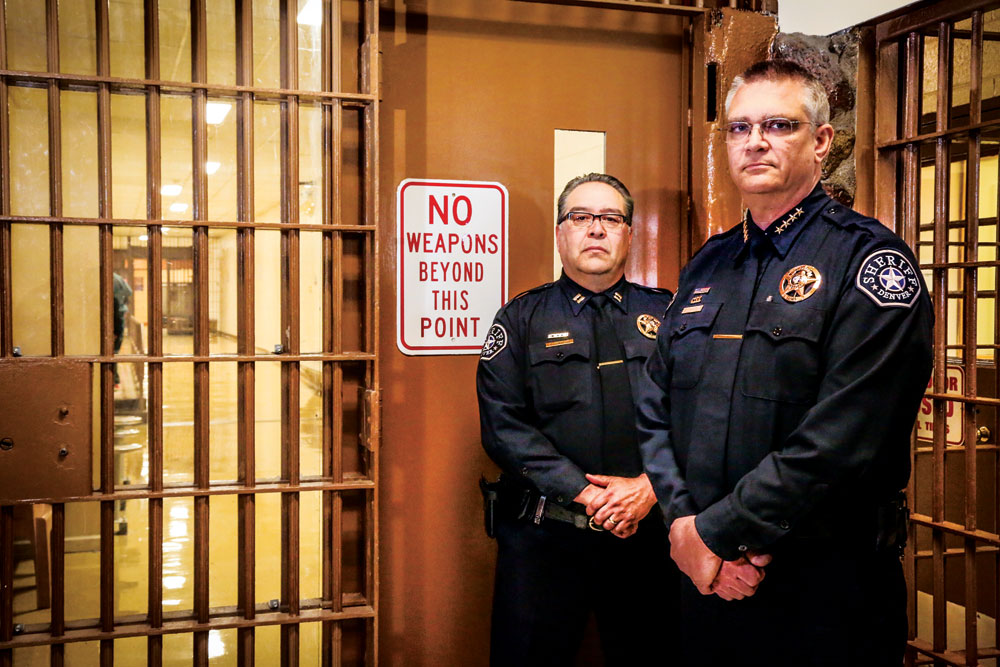
The jail is NE Denver’s neighbor. The man who runs it, Sheriff Patrick Firman (right), has been charged with reforms not just in this jail, but across the department. Training Academy Commander Captain Anthony Gettler (left) is enthusiastic about one of the reforms.
Running the state’s largest sheriff’s department is no small task, but arriving from out of state with a mandate to implement change would undoubtedly be daunting. Denver Sheriff Patrick Firman, however, recalls his arrival in Denver not just as challenging, but as a welcome opportunity and the logical next step in a long career.

Yoga is helping deputies use mindfulness and resilience in dealing with stressful situations.
“Corrections is my passion….I came up through the ranks working in the jail, started as a deputy on midnight shift and worked my way up, just really fell in love with the work that they did and the people that worked there.” When he speaks of his staff here, he is equally enthusiastic. “To see how these deputies interact with a very, very challenging population is just,” he pauses, “to this day, I get excited about it. It’s such a unique skill set that they have.”
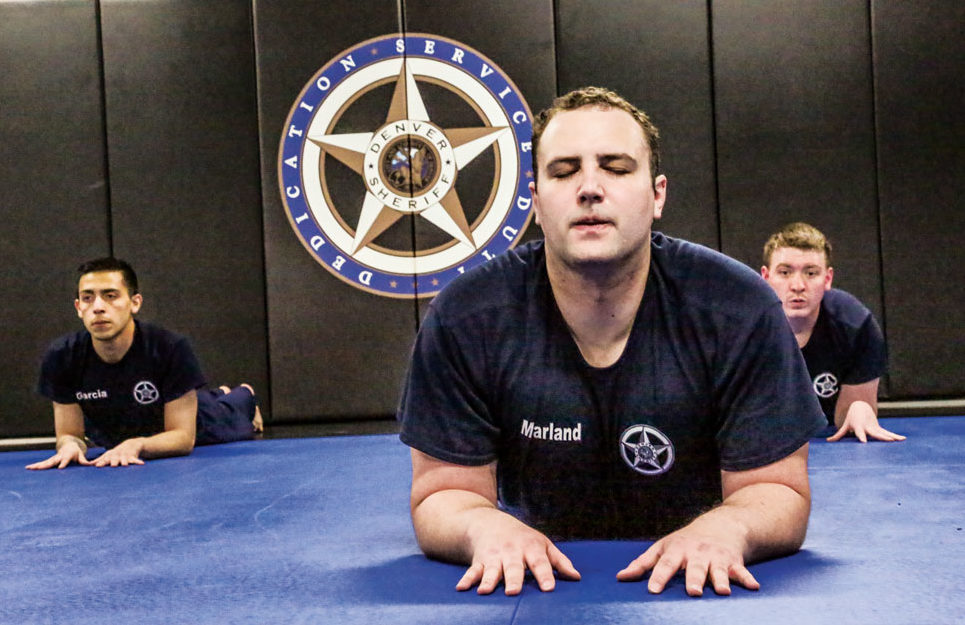
Yoga is helping deputies use mindfulness and resilience in dealing with stressful situations.
After a nationwide search for the best candidate, Mayor Michael Hancock appointed Firman sheriff in October 2015 and tasked him with leading a department rich in history and culture but also in serious need of change. Approximately 418 changes, in fact. When Firman came to Colorado from northern Illinois, he was charged with addressing a list of 418 reform recommendations for his department.
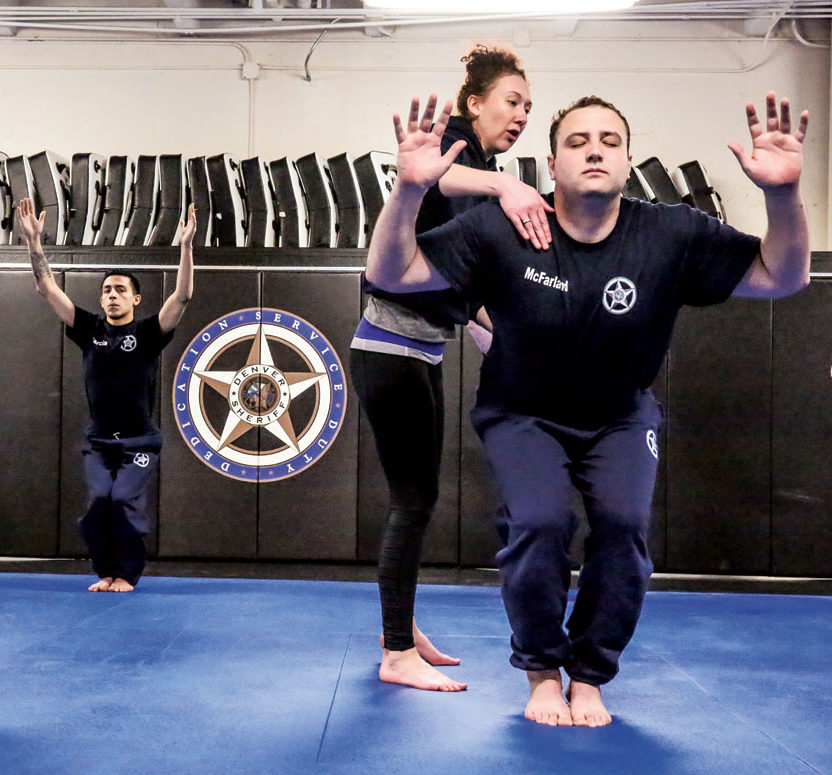
Olivia Mead founded and teaches Yoga For First Responders to recruits at the Sheriff’s Academy and at the Fire Academy.
Implementing Reforms
Firman’s first order of business was to identify how to implement the most critical reforms at the same time that his office maintained its duties to the City and County of Denver, including overseeing two detention centers, a wing at Denver Health Medical Center, district and county courthouse security, and state inmate transportation.
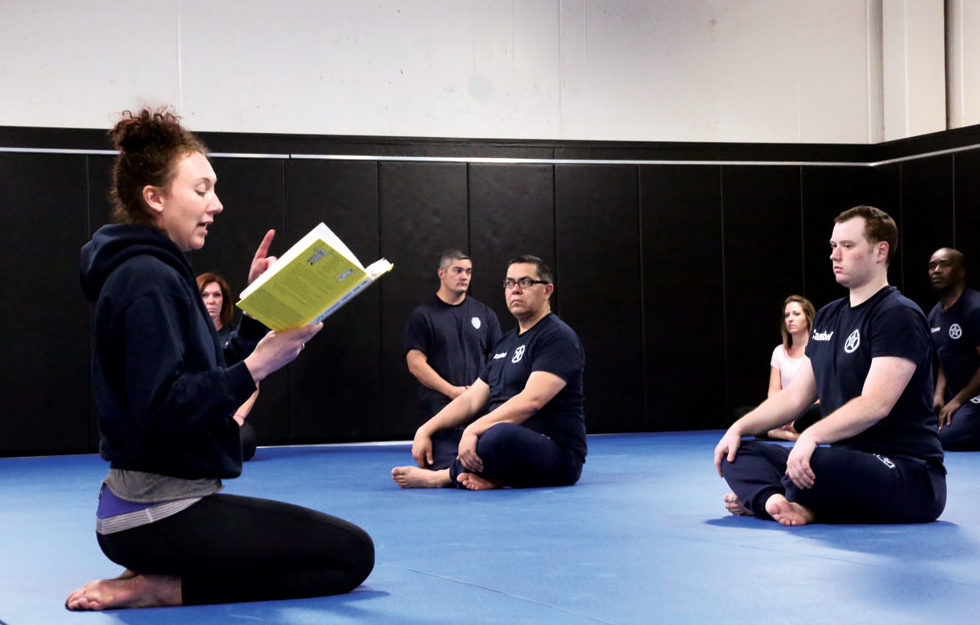
Olivia Mead reads “The true intention is to have mastery over the mind and your entire psychophysiological system, including strength and mobility.”
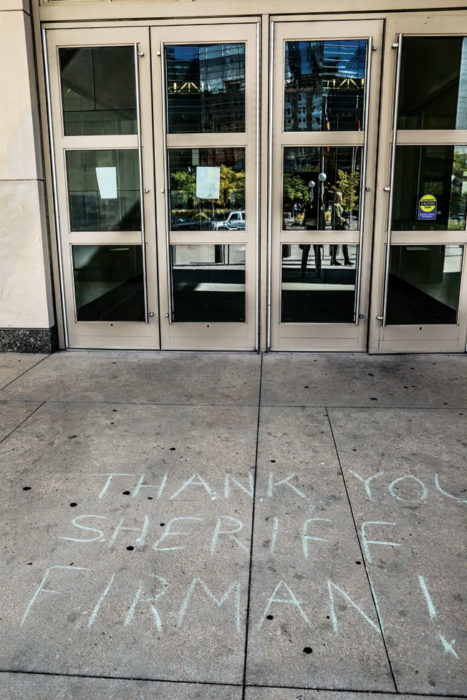
After anti-sheriff signs stolen from a critic were retrieved and returned by the sheriff, the victim wrote this message at the entrance to the sheriff’s office building.
After hiring about 100 new deputies in 2016, Firman made it a priority to add training for all staff and deputies that same year. With an estimated 50% of all inmates suffering from some mental health issues, training staff to safely interact with those in crisis was a critical need. “Everybody that comes in here is in crisis somehow. They’re at pretty much the lowest point of their life. We’re dealing with all of that, which is why it’s so important that our staff have the training that they do … to deescalate and be able to understand how to relate with that population,” Firman says.
Just three weeks after Firman’s arrival in Denver, the acute need for ongoing training was made tragically clear with the death of Michael Marshall while in Denver Sheriff Department (DSD) custody. Marshall suffered from schizophrenia and had been arrested for trespassing and disturbing the peace. He was held at the Van Cise-Simonet Detention Center downtown for several days before deputies’ efforts to restrain him during an episode of erratic behavior resulted in him losing consciousness and aspirating on his vomit. Marshall spent nine days in a coma before he died. The Office of the Medical Examiner characterized his death as a homicide. In 2017, the City and County of Denver settled a lawsuit with Marshall’s family for $4.65 million and agreed to change some of the practices at the jail relative to the care of inmates with mental health issues.
Responding to Mental Health Needs in Jails
In the wake of Marshall’s death, the DSD spent over $1 million to give its 700 deputies Crisis Intervention Training (CIT). DSD now requires CIT for all new deputies. According to the National Alliance on Mental Illness, CIT is key to helping people with mental illness receive the services they need. It also reduces first responders’ injuries during interactions with those in crisis. By diverting people in need of mental health services from jails, communities can also save money by focusing resources on treatment rather than incarceration.
To move forward, Firman sees a shift in culture, both toward inmates and also for deputies, as essential. Employee well being is high on his list of priorities. Deputies are with inmates for about ten hours a day; it’s an intense and demanding job, and the stress level can be very high.
Employee Wellness
Yoga For First Responders (YFRR) has been part of the menu of employee wellness efforts since 2017, when representatives of the City and County of Denver Safety Department underwent a 60-hour training. Training Academy Commander Captain Anthony Gettler, who has been with the Sheriff’s Department for almost 22 years, speaks with genuine enthusiasm about the yoga program. “This isn’t about stretching and doing phenomenal poses; it’s more about mindfulness and resilience and being able to process stress….When you get in a high-stress situation, you can use your breathing to get through those situations.”
“We want to make sure that employees are taking care of themselves,” says Firman. “… it’s incredibly important that they understand … if they’re not taking care of themselves on the outside, if they’re having bad relationships with their family members or with their spouse, if they’ve got financial issues on the outside, if they’re not healthy and they come in here, that’s going to affect the decisions they make.”
Olivia Mead, who established YFRR in 2013, sought “to serve my community by serving first responders.” She developed job-specific and culturally-informed protocols tailored to help first responders. “They see more trauma, loss, destruction and death in one day than most people see their whole lives. There’s a lot of cumulative stress; however, we’re not therapists and we have to be careful that we don’t trigger or unlatch that trauma in our yoga practice, but stay in our lane and help people to process that stress.”
Mead praises Denver Public Safety’s commitment to YFRR across all its departments. “They are really fantastic, and Denver is a flagship for us as a result.” She emphasizes that YFRR is an investment in long-term employee wellbeing. “We’re really teaching mental and neurological fitness. We’re not there to touch toes. We’re there to process stress, build resilience, and improve job performance.” YFFR is the only nonprofit offering this type of specialized training according to Mead. To learn more, see http://yogaforfirstresponders.org/
Firman reports that DSD has taken action on 99% of the 418 reform recommendations, with the last recommendation being the implementation of a new Jail Management Enterprise system that is expected to go into effect at the end of 2019. In addition to CIT and wellness programs, DSD established a Data Science Unit to improve data collection and analysis and modernized its computer systems. It created a Change Pod at the downtown facility for “inmates that are highly motivated to make positive changes in their lives,” with targeted interventions and services to facilitate their transition upon release. Firman says collaboration with other departments has been pivotal to many of the positive changes DSD has seen since his arrival. “I think it’s one of the reasons why Denver is making such headway in this whereas other cities may not be able to is because there’s such a sense of collaboration and cooperation in Denver. A big part of that is because we all work under the umbrella of public safety. We’re all going towards the same thing as part of the same team.”



0 Comments